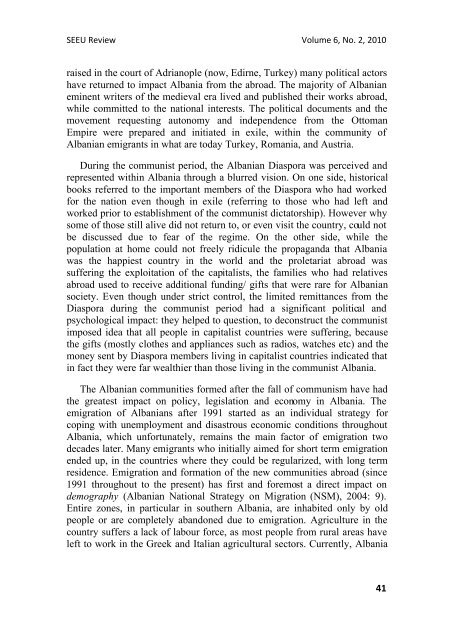SEEU Review vol. 6 Nr. 2 (pdf) - South East European University
SEEU Review vol. 6 Nr. 2 (pdf) - South East European University
SEEU Review vol. 6 Nr. 2 (pdf) - South East European University
You also want an ePaper? Increase the reach of your titles
YUMPU automatically turns print PDFs into web optimized ePapers that Google loves.
<strong>SEEU</strong> <strong>Review</strong> Volume 6, No. 2, 2010raised in the court of Adrianople (now, Edirne, Turkey) many political actorshave returned to impact Albania from the abroad. The majority of Albanianeminent writers of the medieval era lived and published their works abroad,while committed to the national interests. The political documents and themovement requesting autonomy and independence from the OttomanEmpire were prepared and initiated in exile, within the community ofAlbanian emigrants in what are today Turkey, Romania, and Austria.During the communist period, the Albanian Diaspora was perceived andrepresented within Albania through a blurred vision. On one side, historicalbooks referred to the important members of the Diaspora who had workedfor the nation even though in exile (referring to those who had left andworked prior to establishment of the communist dictatorship). However whysome of those still alive did not return to, or even visit the country, could notbe discussed due to fear of the regime. On the other side, while thepopulation at home could not freely ridicule the propaganda that Albaniawas the happiest country in the world and the proletariat abroad wassuffering the exploitation of the capitalists, the families who had relativesabroad used to receive additional funding/ gifts that were rare for Albaniansociety. Even though under strict control, the limited remittances from theDiaspora during the communist period had a significant political andpsychological impact: they helped to question, to deconstruct the communistimposed idea that all people in capitalist countries were suffering, becausethe gifts (mostly clothes and appliances such as radios, watches etc) and themoney sent by Diaspora members living in capitalist countries indicated thatin fact they were far wealthier than those living in the communist Albania.The Albanian communities formed after the fall of communism have hadthe greatest impact on policy, legislation and economy in Albania. Theemigration of Albanians after 1991 started as an individual strategy forcoping with unemployment and disastrous economic conditions throughoutAlbania, which unfortunately, remains the main factor of emigration twodecades later. Many emigrants who initially aimed for short term emigrationended up, in the countries where they could be regularized, with long termresidence. Emigration and formation of the new communities abroad (since1991 throughout to the present) has first and foremost a direct impact ondemography (Albanian National Strategy on Migration (NSM), 2004: 9).Entire zones, in particular in southern Albania, are inhabited only by oldpeople or are completely abandoned due to emigration. Agriculture in thecountry suffers a lack of labour force, as most people from rural areas haveleft to work in the Greek and Italian agricultural sectors. Currently, Albania41
















